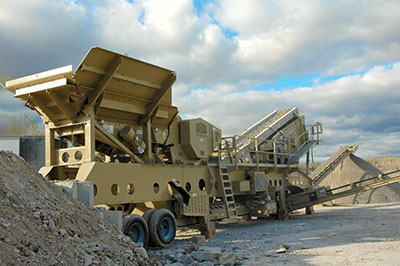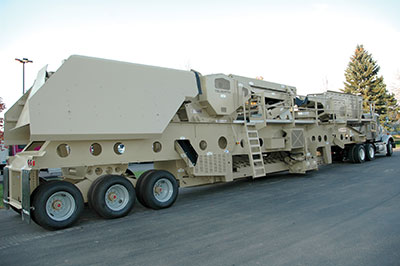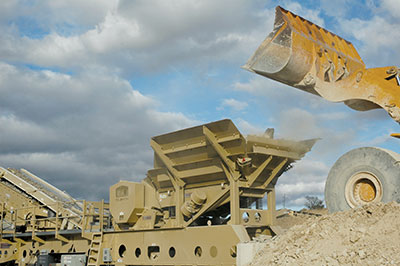
Features
Aggregates
Profiles
Taking Command of Crushing
An Alberta company discovers the benefit of owning its own crushing operation.
June 14, 2013 By Carol Wasson
The city of Grande Prairie has emerged as one of the fastest growing
metropolitan centres in Western Canada, with its abundance of both
renewable and non-renewable resources ranging from agriculture and
forestry to oil and natural gas.
The city of Grande Prairie has emerged as one of the fastest growing metropolitan centres in Western Canada, with its abundance of both renewable and non-renewable resources ranging from agriculture and forestry to oil and natural gas. Benefiting from the city’s strong economic position are businesses such as locally owned and operated Reco Construction, which has provided high-quality highway roadbuilding and asphalt paving and repair for more than 40 years. According to Grant Wald, one of Reco Construction’s owners, the company is strategically poised to serve the booming oil industry, with services such as oilfield lease padding and rig ditching. However, the larger portion of its projects stems from the major municipal growth in the region.

|
With a short May through October construction season, Wald says that his operation must capitalize on every opportunity, or as the old saying goes, make hay while the sun shines. He put the latter into high gear with the recent acquisition of a new portable crushing and screening plant, which would allow the company to have greater control over job scheduling and costs, and material quality and availability. For the last 12 years, the company had hired a subcontractor to process materials at each of its four pits.
“It was always hard to co-ordinate our projects with a subcontractor’s schedule, so we were constantly juggling jobs and inventory. We had to get our own plant so that we could have the right materials at the right time,” says Wald, adding that with the short notice given on oil field projects, one might have to turn down jobs if processed material is not readily available.
A new solution
Wald understood that it was time to rein in the crushing end of his operation. Bringing the work in house would allow aggregate production to be done when the company needed the product, or had the time to focus on crushing operations.
 |
|
| The JCP 2238-38 arrives at the Reco Construction site in Grande Prairie, Alta. Reco worked with The Groundworx Co. from nearby Nisku to find the right fit for its crushing needs.
|
After consulting with The Groundworx Co., a local equipment dealer based in Nisku, Alta., Reco purchased a new Telsmith JCP 2238-38, which is a two-stage portable crushing plant. “We felt that Groundworx had the most expertise in crushing and screening in our region. They understood our requirements and steered us to the Telsmith plant as it was all one chassis,” says Wald.
The JCP 2238-38 includes a Model H2238 Hydra-Jaw Crusher; a 38SBS Cone Crusher, a 36-inch x 12-foot vibrating grizzly feeder and a Telsmith five-foot x 15-foot triple-deck inclined screen. “Telsmith did a tremendous amount of engineering to place all these components, plus the conveyors, on one chassis; and they have continued to work with us to tweak the plant to meet our needs,” says Wald. “We mine a very abrasive quartzite river rock and the jaw needs to handle up to a 20-inch maximum feed size. Our required products include a ¾-inch crushed gravel for roadway base course; and an asphalt rock that is split three ways and blended back at a specified rate. The new plant will handle this, and ultimately gives us the complete control we need over the finished product,” he says.
That finished product can be created at any of Reco’s four pits thanks to the additional equipment it already has in place at each of the sites. Each of its pits has one excavator and one loader to feed rock into the new crusher. Reco uses Cat 320, Deere 340, Deere 450D and Komatsu PC300 excavators, with two Cat 980G and a pair of Komatsu 320 loaders for digging out and moving the quartzite river rock. Reco also uses three dozers for its pit sites, two Cat 824s and a Cat D7. The crushing operation can move at a steady pace thanks to Reco’s 25 Kenworth gravel trucks that can supply the aggregate to both the company’s roadbuilding sites and its AlMix asphalt plant and silo.
Reco Construction has a full paving operation, with enough machinery for two crews to work simultaneously. A pair of Cat 140 graders and two Case 85XT skid steers work to prepare the road. The company has two options for pavers, a Vogele and a Leeboy, with a pair of Cat packers and two Dynapac CC102 articulated tandem rollers and a Dynapac CP30 pneumatic tire roller for compaction.
Having its own portable crushing operation gives the company the flexibility to prepare the perfect aggregate size and mix to meet the specific job requirements.
Features that increase quality
One of the biggest draws for Weld and his team was the size capabilities of the Telsmith JCP 2238-38. Telsmith engineers note that the H2238 handles up to 533 millimetres (21 inches) of quarried stone feed, and offers push-button hydraulic adjustment, automatic tramp iron relief and auto reset, and remote control hydraulic chamber clearing – all features that contribute to reduced downtown and greater operational safety. “We are able to keep our operators away from potentially risky situations as we can make all of our adjustments, or safely clear the chamber, right from the tower,” says Wald. “Also, unlike most jaws, the H2238 is designed with both jaw plates being the same. One spare jaw plate fits either side. This means less components that you need to inventory – and that is a big plus,” he adds.

|
|
| “We mine a very abrasive quartzite river rock and the jaw need to handle up to a 20-inch maximum feed size,” says Wald. “The new plant will handle this, and ultimately gives us the complete control we need over the finished product.”
|
Regarding the 38SBS Cone, Wald says that its hydraulic dynamic adjust system is integral to his operation. “Unlike older cone models, you don’t have to shim it to adjust it. Without a self-adjusting cone, the downtime would have killed us, especially when making asphalt rock,” he says. Wald also points to the fact that the SBS does not utilize a nitrogen-based hydraulic system. Its single power unit utilizes a pressure-compensated variable displacement pump to provide the correct hydraulic flow and pressure at all times. Since no accumulators are used, the result is more consistent pressure and less maintenance and downtime, he explains.
Wald says that typically his crew will relocate the portable plant about once a month. “It only takes a day to move and be ready to crush in the next location. As the plant is a self-contained unit, it can be moved cost-efficiently with minimal disconnection,” he says.
A purchase that saves money
Most importantly, Wald stresses, the new portable plant has allowed his operation to gain control over job costs and profitability goals. “First, depending upon the job location and requirements, we can move the plant strategically to save on trucking costs,” he says. “Before we had our own plant, we had to stockpile thousands of tons at each pit. But if we would run out of material at any one of the pits, that might cause us to lose our competitive edge due to trucking costs. You can’t get the bid and be profitable if you’re hauling from the wrong pit,” he adds.
Maintaining an even cash flow is also a big advantage. “We used to crush up to $600,000 worth of material in the spring to service the entire season’s upcoming projects. With our own plant that huge springtime cash outlay is no longer a factor,” says Wald.
Mobile crushing has allowed Reco Construction to be proactive as well as reactive. Management has the foresight to tackle a rapidly evolving market and the flexibility to quickly adapt to the needs of each and every project. “Previously we were guessing as to where we needed to build material inventory. Now as we see the next job coming, we can easily move to the nearest pit and crush there. From job to job, our customers dictate where and when we will crush. Mobility is a must,” says Wald.
This article was written by Carol Wasson on behalf of Telsmith Inc., and includes files from Andrew Macklin.
Print this page